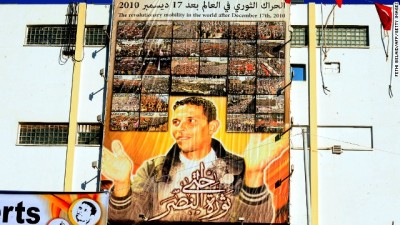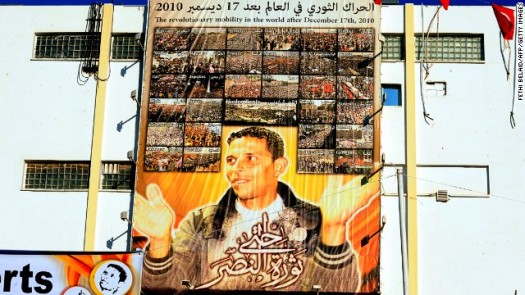
By:Raghida Dergham*
This week, Tunisia rescued what was called four years ago the Jasmine revolution, which gave birth to the Arab Spring, by letting the whole world know that it rejects imposing religion on the state, and that it insists on secularism and modernity.
The victory of the secular Call of Tunisia Party with a margin of 16 seats ahead of the Islamist Ennahda Party, sends a message to the Muslim Brotherhood in Tunisia just like the one the Egyptian people sent to the Muslim brotherhood there, as if to say: We do not want you to rule us. The Tunisians’ boldness, and the boldness of their women, men, and civil society organizations, deserve praise and for us to celebrate with them their victory in the elections. The Tunisians have revived hopes concerning the process of change in the Arab region. The Egyptians too deserve for us to recognize their ability to rise up when things go counter to the revolution’s promises. Had they not toppled President Mohammad Mursi, the Muslim Brotherhood’s sinister project would have succeeded, and most likely, Tunisia would not have been to recover from the Muslim Brotherhood either, no matter how much it rebelled.
All eyes are on the fate of the Muslim Brotherhood in Yemen now, where they were defeated at the hands of the Houthis. The Houthis are now fighting al-Qaeda in Yemen, which is bent on denying the Houthis the chance to enjoy their victories throughout Yemen. In Yemen, it is very difficult to celebrate, because this ancient country has become the most recent battlefield for devastating wars of attrition at the hands of its tribes and leaders who do not want to relinquish power. Not long ago, this country was gearing up to celebrate the peaceful transition from a simple state to a compound – i.e. federal – state. Today, all causes for optimism have been shattered, and celebrations have been postponed indefinitely. The Iraqis are trying to summon hope for a better future to their country, but so far, they are still in the waiting room of the international and regional actors, so to speak. Libyan liberals will get a dose of hope and determination thanks to what happened in neighboring Tunisia, but may God help them. The Syrians are scattered, fragmented, divided, polarized, and fighting a bloody conflict. The Kurds have become the first line of defense against ISIS, threatening their once-flourishing hopes. And the Lebanese are coexisting with instability and triumphing – like they did this week – over religious and sectarian agendas, refusing to be drawn into the Syrian quagmire.
The events in Tripoli in northern Lebanon could have had much direr consequences were it not for the wisdom of the Sunni community, which proved that it is not a popular support base for ISIS or al-Nusra Front, and backed the Lebanese army unequivocally despite its reservations over some of the army’s actions. The Lebanese army has become the backbone of cohesion among the Lebanese, despite their divisions. For this reason, it is not permissible for the army to make any mistakes, because this could undermine the cohesion behind its support; if this happens, civil war could become a distinct possibility.
Need for vigilance
For the time being, there is no real risk of civil war in Lebanon, though nothing in Lebanon is certain. Logically speaking and based on analyzing major policy trends, it seems that there is a regional and international decision to safeguard Lebanon from slipping into a full-blown conflict. For this reason, every now and then, Lebanon is rescued from the clutches of war that either Damascus wants to export to Lebanon, or ISIS wants to draw Lebanon into.
But at the local level, there is an urgent need to be vigilant no matter what the international decisions are. Sunni citizens in Tripoli want the army to be equally determined to rein in anyone that could threaten the country, not just Sunni suspects. Such discrimination fuels mistrust in the army, and threatens to explode the fragile equation between Sunnis and Shias in Lebanon, specifically over Hezbollah’s involvement in the conflict in Syria alongside the regime in Damascus – and the retaliation from al-Nusra Front and ISIS inside Lebanon as a result.
It would have been better if Hezbollah Secretary-General Sayyed Hassan Nasrallah did not declare that Wahhabism was behind the Takfiri phenomenon – at a time when Sunnis in Lebanon, with encouragement from their leaders in Lebanon and their allies in Saudi Arabia, were voicing their support for the army in its operations against extremist Sunni organizations. No matter what the Iranian message addressed to Saudi Arabia through that statement was, it would have been much more prudent if Hezbollah avoided gambling with stability and security in Lebanon, supposedly Hezbollah’s country rather than Iran.
Clearly, Saudi-Iranian relations are not in good shape, even though there had been a breakthrough with their consensus on abandoning former Iraqi Prime Minister Nuri al-Maliki and with the visit made by the Iranian Deputy Foreign Minister to Riyadh. What sabotaged the march towards further accords were the surprising events in Yemen, where Iranian support for the Houthis led to the latter overrunning the capital Sana’a and then various Yemeni provinces all the way to the strategic region of Bab al-Mandab.
Saudi Arabia seems reluctant to be involved in Yemen at this stage. This what Saudi diplomacy suggests. Saudi Arabia seems confident that the Houthis’ expansion in the country is not sustainable. Indeed, al-Qaeda is already tackling the Houthis, after they deposed the Muslim Brotherhood in Yemen and undid their victories. Moreover, former President Ali Abdullah Saleh is trying to lure Saudi Arabia to pay the cost of his return to power – directly or through his son – leveraging his influence with the Houthis and his ostensible ability to rein them in. The Saudi response so far has been to tell Saleh that his “betrayal” is unforgivable. For this reason, the countries of the Gulf Cooperation Council – which was behind the Gulf initiative in 2011 under which Ali Abdullah Saleh left the country and received immunity – have told the UN Security Council that the collapse of the initiative would mean ending the immunity deal given to Ali Abdullah Saleh.
That the U.N. Security Council has imposed sanctions on Ali Abdullah Saleh and Houthi leaders is nothing to scoff at, though it is not a decisive measure. Ali Abdullah Saleh has shown arrogance and defiance as if to say: Prove the accusations if you can. But this happened. It has been established that he manipulated the fate of Yemen for the sake of his vengeful agenda, by supporting the coup staged by the Houthis, and by corrupting the Yemeni army. This is how we got to the current outcome in Yemen, especially under the current weak president, who did not know that his weakness was exploited by both the Houthis and Ali Abdullah Saleh.
What is sinister in Yemen is not only the meddling by regional powers, the ideology of religious groups like the Muslim Brotherhood, the proxy wars, the US drone strikes, and the foothold al-Qaeda has in Yemen. It is also the fact that it has been decided to let Yemen fall into chaos, with its tribes and those flocking to it to fight wars of attrition. In Yemen, attrition is a policy.
The Islamic Republic of Iran is fully aware of the cost of attrition for it in Yemen. For one thing, Iran is also facing a war of attrition in Syria, and realizes that the latter could well become Iran’s own Vietnam. Now that Yemen as been added to the list, Tehran fears being drained on two fronts – even if it is not fighting there with its own soldiers, people, and cities.
More setbacks
Tehran is also reeling from another setback, namely, deteriorated finances as oil prices have fallen in a way that is harmful to the Iranians. Like Russia, Iran believes that the collapse of the oil prices is an American-Saudi conspiracy against it, given the impact of the sudden slump in prices on the economy in both countries, and on Iran’s ability to continue expanding its roles in Syria, Yemen, Iraq, and Lebanon.
Perhaps this explains the new Saudi policy directed at Iran: refraining from direct intervention in Yemen, for example, while Iran and its allies are involved in wars of attrition; limiting the intervention in Syria to the US-led coalition against ISIS, while insisting on urging the Americans to deliver on their pledge to depose President Bashar al-Assad at a later time; trying to build on the situation in Iraq, including by using its direct influence with tribes to fight ISIS, when US-Iraqi negotiations mature in this direction; and supporting accords over Lebanon, which could help bring about the extension of parliament’s term for two more years and elect a president soon – perhaps before year’s end – while continuing to support the army and encourage Sunnis in Lebanon to support the army morally and politically.
Amid such confusion in the Arab region and a growingly pessimistic outlook, there is a glimmer of hope, if not something more. The events in Tunisia are not a dim light, but a bright beam that promises change in the Arab region. The developments in Lebanon are encouraging, despite the grave danger the country faced last week, which demonstrated popular awareness and insistence on avoiding a war of attrition. There may be a glimmer of hope regarding tribal, sectarian, and regional-international accords on the basis of agreeing to eliminate ISIS’s projects to destroy states. Everyone is aware of the danger. Egypt is taking necessary precautions to protect itself from being implicated and from terrorist plans against it. Egypt continues its march toward recovery and the restoration of its leading role in the region, especially if President Sisi couples his security measures with a bid to protect freedoms and basic human rights.
One hopes that Yemen, Libya, and Syria do not descend into even bigger tragedies, but the signs are not encouraging and do not suggest there will be a change in their situation any time soon. More likely, we will see a protracted conflict in Syria and Yemen, while Libya will remain in intensive care. Still, there are hopes the international community would take interest in Libya again, and perhaps a breeze of Tunisia’s jasmines will blow and revive Libya’s aspirations.
This article was first published in al-Hayat on Friday, Oct. 31, 2014, and was translated by Karim Traboulsi.
———————————-
Raghida Dergham is Columnist and Senior Diplomatic Correspondent for the London-based al-Hayat newspaper . Dergham is also a Political Analyst for NBC, MSNBC and the Arab satellite LBC. She is a Contributing Editor for LA Times Syndicate Global Viewpoint and has contributed to: The New York Times, The Washington Post, The International Herald Tribune and Newsweek Magazine.
Al Arabiya


Leave a Reply
You must be logged in to post a comment.